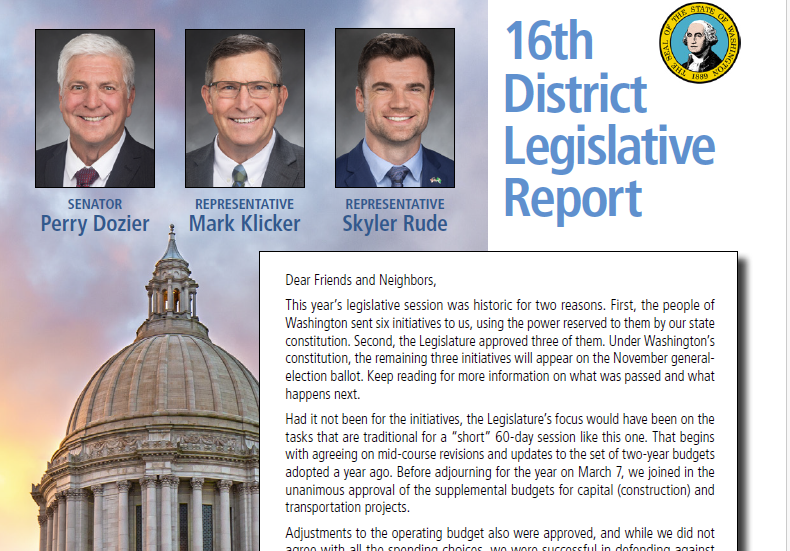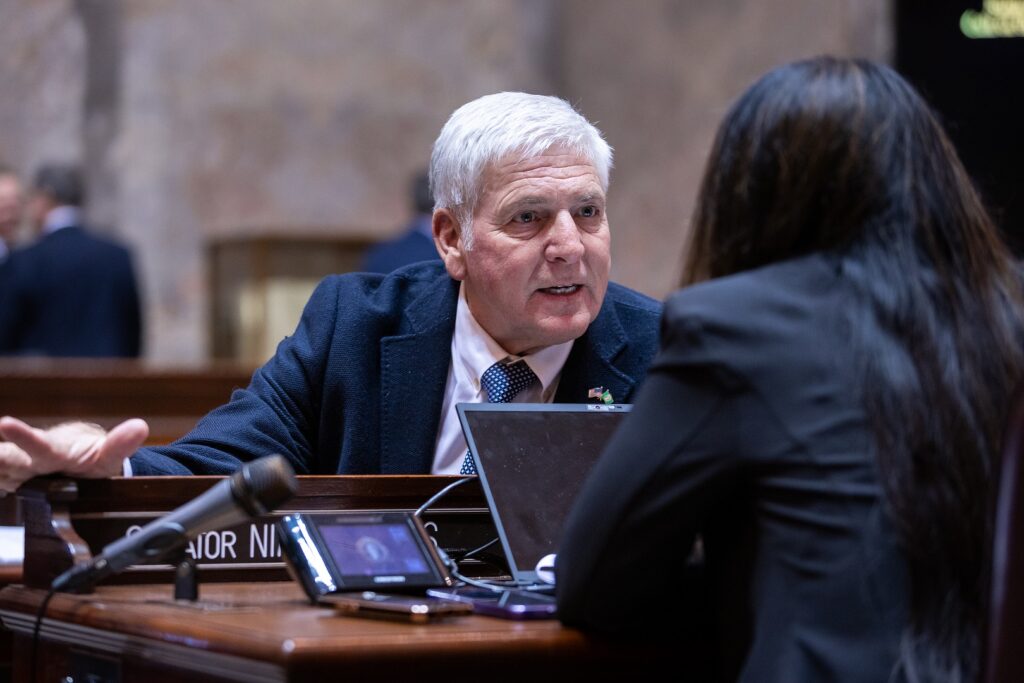Dear Neighbor,
Greetings from… here in the 16th District!
Let me begin with a quick piece of housekeeping. Legislators who declare their candidacy for public office (like being re-elected to the Senate) must abide by a strict set of rules when it comes to communicating using official tools.
For me, those tools include my Senate website, my legislative Facebook page, and e-newsletters. Therefore, I can’t update my website and FB page or send you another report like this until after the November election. Some refer to this as the “campaign freeze.” However, I am free to continue responding to questions and messages – so please, keep the emails, phone calls and letters coming!
The session summary from our 16th District delegation was also mailed recently; click here or on the image below to view it. Among the topics it covers are the history-making six initiatives submitted to the Legislature, and how three were passed – with the other three going to the November ballot.
The post-session report also details some of the dozen bills I sponsored that are becoming law this year, led by my SB 6328. It updates a property-tax exemption that benefits the widows and widowers of honorably discharged veterans. I wish we could have done more to control property taxes, but at least we kept the majority from clearing the way for the largest property-tax increase in state history.
Also, thanks again to the many who took time in early April to attend our 16th District town halls in Prosser, Pasco and Walla Walla. I always appreciate the questions and conversations!
 |
Stunning loss of Washington farms
confirms need for ‘Cultivate Washington’
I knew the number of farms in our state has been dwindling, in part because of onerous state regulations. But I didn’t realize it was to the extent described by another farmer recently in The Seattle Times.
A guest column from Pam Lewison, who farms in the Moses Lake area and directs the Center for Agriculture at the Washington Policy Center, cites some painful statistics from the U.S. Census of Agriculture.
Between 2017 and 2022, our state lost 3,717 farms and ranches. That’s 14 farms per week, on average. And more than the 3,456 farms lost during the decade ending in 2017.
Click here for the full column, which does a thorough if sobering job of ticking through many of the factors that are behind this stunning drop in the number of farms, and explaining why it should alarm people across our state, not just those in the agriculture sector.
After more than 40 years of farming, I can relate all too well to these concerns. As a senator and former county commissioner, I have an even broader sense of why they exist and how government is involved.
If you did not receive my special post-session report on agriculture, it’s posted online here. Also, several of the reasons line up with the priorities in the Cultivate Washington agenda I and other Senate Republicans unveiled late last year. Click here for it.
 |
Sen. Nikki Torres, R-Pasco, has been a tremendous ally on issues facing our part of the state.
16th District among many caught up in ‘gerrymandering’
During the 2022 session I was among the majority of legislators who supported the resolution adopting new boundaries for our state’s 49 legislative districts.
In Washington, the boundaries are set by an independent, bipartisan commission, using the latest U.S. Census data. Because our state’s population expanded and shifted in the previous 10 years, the commission had to create and approve a map that would make legislative districts as even as possible in population – approximately 157,000 residents per district.
The map we endorsed had been created and approved by the commission in November 2021. One of the notable aspects was that it made the neighboring 15th Legislative District, which spans most of the Yakima Valley, a “majority-minority” district.
The commission agreed that the voting-age population in the 15th District, based on the census numbers, would be 51.5% Hispanic; the overall population was 73% Hispanic.
Amazingly, the district wasn’t Hispanic enough for the out-of-state interests that filed suit soon after we had approved the new map(s). In the 2022 election, the district’s voters overwhelmingly chose a Hispanic woman as their new senator – a first in the 15th District. Even so, the plaintiffs chose to continue their legal challenges. I figure it’s because that senator, Nikki Torres of Pasco, is a Republican.
Under Washington law, responsibility for modifying a legislative-district map clearly belongs to the state redistricting commission. We could and should have called a very brief, “special” legislative session back in the fall to reconvene the commission. The governor and the Legislature’s top Democrats all refused.
I also supported an effort early in this year’s legislative session to reconvene the redistricting commission. Our majority colleagues said no, knowing it would allow a federal judge to take over and redraw the map without any legislative oversight or assurance of bipartisanship.
As a result, many legislative districts have new boundaries – from a map drawn by the plaintiffs, which doesn’t seem impartial.
Senator Torres, who has been a terrific colleague these past two years, now finds herself a resident of our 16th District. She can still serve the rest of her term without having to relocate, but I know there were other ways to redraw the 15th District without having such a ripple effect. The senators for the 12th and 14th districts also got “redistricted out.” They too are Republicans.
The term “gerrymandering” goes back more than 200 years. It refers to giving one party an unfair advantage. In 1983, when Washington voters handed the responsibility for redistricting to an independent, bipartisan commission – at the Legislature’s request – it seemed like our state would be safe from gerrymandering.
Apparently not, because a bunch of partisans figured out how to do an end-run on the commission. I realize the 15th District has been represented in the state Senate by Republicans since 1943, but come on. Let’s play fair. This is wrong.
***
I am working to make living in our state more affordable, make our communities safer, uphold our paramount duty to provide for schools, and hold state government accountable. I’ll work with anyone who shares those goals and wants to find solutions.
Please reach out to my office with your thoughts, ideas and concerns on matters of importance to you. I am here to serve and look forward to hearing from you.
Sincerely,















